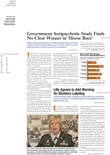A boy from New Orleans, evacuated to Houston following Hurricane Katrina, related, with evident pleasure, “Everything I have is new.”
Being able to reframe his experience this way allows this boy to move forward,” observed Betty Pfefferbaum, M.D., J.D., director of the terrorism and disaster branch of the National Center for Child Traumatic Stress.
But many children caught up in hurricanes Katrina and Rita, particularly those who experienced flooding and needed rescue, still feel anxiety, including separation anxiety, noted Pfefferbaum, professor and chair of psychiatry and behavioral sciences at the University of Oklahoma College of Medicine. These children express concerns about being protected in their homes, communities, and society.
Those who lost loved ones are dealing with grief; some may be experiencing traumatic grief that hinders their ability to adjust to their loss. Some may go on to develop depression or posttraumatic stress disorder (PTSD), added Pfefferbaum, who has studied exposure and peritraumatic response as predictors of posttraumatic stress in children after the 1995 bombing of the federal building in Oklahoma City and other disasters.
The hurricanes exposed the impoverished conditions in which many children and families in this country live, she said, conditions that may hamper recovery. The government's slow response raised concerns about the country's ability to respond to major disasters and challenged both adults' and children's expectations of safety and security.
“Evacuees from New Orleans and many other coastal communities will be displaced for months, perhaps much longer—a very long time in the life of a child,” Pfefferbaum said. “Some children may relocate in towns, schools, and neighborhoods where they are welcomed with open arms. Others may not be so fortunate.”
As these children and their families resettle across the nation, psychiatrists and mental health professionals can help identify those who may need further screening and preventive treatment with the Hurricane Assessment and Referral Tool for Children and Adolescents (see box for Web address) developed by the National Child Traumatic Stress Network (NCTSN). The NCTSN is a consortium of 54 centers, including Pfefferbaum's, funded by the Center for Mental Health Services of the Substance Abuse and Mental Health Services Administration (SAMHSA).
The questionnaire asks about injuries or deaths of loved ones; loss of home, pets, and possessions; difficulty in evacuation; and recent and earlier exposure to death, violence, looting, and psychiatric illness. The NCTSN and other federal and medical organizations offer numerous other materials online to assist first responders, psychiatrists and mental health practitioners, parents, teachers, and others (see box below).
“Parents, teachers, and other adults tend to underestimate reactions of traumatized children,” Pfefferbaum said. “It's vital to ask children what their experiences were and how they reacted,” she added.“ It's also important to learn how they conceptualized what happened and to correct any misconceptions they may have.”
Even children with no direct exposure or family ties to the recent hurricanes need attention, Pfefferbaum added. Children exposed to hurricanes in Florida last year, for example, are still in the recovery phase and vulnerable to retraumatization. Probably every child in the United States heard the hurricanes discussed or saw the devastation on television, she said. Viewing repeated images on television makes some children think more disasters are unfolding.
“I would not expect viewing television coverage of the hurricanes to cause PTSD,” Pfefferbaum said. “But children who watched extensive coverage may have heightened stress reactions, anxiety, and fears. Nobody could watch this unfold and not be horrified and frightened by it.”
The centerpiece of the NCTSN's response to the hurricanes is the newly-released “Psychological First Aid Field Operations Guide” (see box on
page 8 for Web address). This practical guide for first responders was developed by NCTSN in collaboration with the National Center for Posttraumatic Stress Disorder and an international team of disaster response experts (
Psychiatric News, October 1).
The NCTSN is providing training in use of the guide for a broad spectrum of potential responders in all states that have applied for federal disaster mental health funding—about three dozen as of October 1—and at NCTSN member sites. It also offers training for psychiatrists and mental health professionals working with children who display disruptive behavior, anxiety, grief, PTSD, and other intensive needs.
“We know a great deal about the effects of disasters on children,” Pfefferbaum said. “We know which interventions help reduce acute and long-term problems. As we respond to the recent hurricanes, we will continue to evaluate these strategies, ideally by assessing those who receive the services.” ▪
